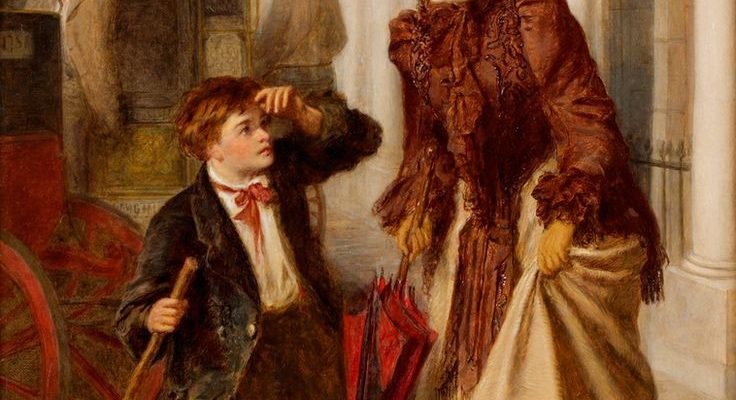When observing the nature of societies, a main factor is the ‘mob’ (for want of a better word), and the ideological direction of thought that it is drifting. George Orwell’s overly used ‘war is peace, freedom is slavery, ignorance is strength’ has become rather cliché in recent years, but we really are in the realm of such rhetoric. You can guarantee now in the present day that for every normal reaction voiced in real life or on the internet, the irrational reactions will be twice as loud and will undoubtedly have the ear of the powers that be. A new additional falsehood to this quote, ‘virtue signalling is selfless’, should probably be added, as there is little virtue these days that does not involve social signalling or a hidden agenda.
Although you might think this phenomenon is a post-1960s reality, it goes much further back. Indeed, one of the most prominent examples of virtue signalling can be found in early 19th century London, and was noticed by the bestselling author Charles Dickens. We may think that foreign aid and the reaction to it – ‘charity starts at home’ – were first birthed in the 20th century, but the reality is very surprising. In his novel Bleak House, Charles Dickens uses the character of Mrs. Jellyby as a literary device to attack what he described as ‘telescopic philanthropy’. Mrs. Jellyby is completely absorbed by her idea of assisting a remote African tribe. At the same time, she is a wife who neglects her husband, she is a mother who neglects her children, and she is a prominent member of society who neglects the poverty-stricken people of the London slums who beg for food.

It is quite incredible to think that as Britain was conquering the globe following the Napoleonic Wars, the same virtue signalling idiots present in today’s society were also prominent then, too. It is hard to imagine that as the Redcoats of the British Army marched from one annexation to the next, there would be Britons back home sending food parcels and messages of support to the foreign enemy, whilst ignoring the British poor sleeping on their doorstep – yet that is exactly what happened. Of course, virtue signalling is much more prominent in the modern world, and technology makes it much easier for it to occur. However, the fact that a 19th century author, who did genuinely care about Britain’s working classes, noticed such a phenomenon in the 1830s is quite surprising.
There has always been treason and mad men, but trying to establish exactly when societal insanity reached a point which became detriment to western civilization is not particularly difficult. Rather than being the start of the current Western madness, the 1960s was in reality the point where it reached such an extent that it began to negatively impact wider society. The example above of Charles Dickens in particular illustrates that the ‘rot’ of the modern age began to fester under the surface during times that were definitely reactionary to some degree. Virtue signalling, rather than being a modern phenomenon, is in reality a historic phenomenon which was expanded, not created, by the modern age.
Indeed, as early as 1701, a British Royal Charter established a Protestant charity (the Society for the Propagation of the Gospel in Foreign Parts). It did initially help British colonists, however its main aim was to spread the gospel and charitable funds to the indigenous peoples of Britain’s emerging Empire. The emergence of similar charitable efforts to help the foreign poor seems to have been common in the 18th century, which coincided with sailing ships being built with metal hulls for the first time, a factor which made sea travel significantly safer.
It is remarkable that at a time when Britain was fighting a major war with France every 20-25 years, and its peasants were often crippled by malnutrition caused by blockades and poor harvests, elements of the urban middle class and aristocracy persuaded the Royal Family to begin foreign aid via the mechanisms of the state religion. The fact that these same poor peasants were asked to donate to such a cause via their parish clergy was probably the final kick in the teeth. The reason for such foreign charity was two separate forms of virtue signalling. The first was the naïve urban middle class Whig, who wanted to loudly proclaim their intent that the Empire should spread the gospel and the enlightenment to every primitive tribe on the planet. The second was the political motive, championed by the aristocracy, which involved a propaganda campaign to convince the world that the British Empire and its marching Redcoats were there to primarily spread education and religion, in order to cover up the rather obvious Faustian and economic realities of territorial expansion.
It is the subject of territorial expansion where virtue signalling has historically been common. During the Gallic Wars in the 50s BC, Julius Caesar wasn’t just fighting the Gauls on military campaigns. He was also fighting a political rearguard action against his own Empire’s Senate as well. He had enemies at home and abroad, and one of the most critical threats to his command of the war was the prospect of him being recalled. This was a time when his command had been extended significantly longer than was usually allowed, and as a result there was growing resentment on the Italian peninsular. One way that his enemies in the Senate tried to oust him sounds very similar to a Senate Committee hearing of left-wing activists during the Vietnam War. Caesar’s political enemies in Rome made contacts with Gaul’s tribal leaders, some of whom Caesar was fighting, and used them to allege that Caesar was committing atrocities and breaching the mandate of his command.
Roman trials, hearings and public speeches were usually not based on who was right or wrong, but instead on who had the best oratory on the day – something which virtue signalers tend to be good at. By emotionally signalling to the mob about the alleged suffering of the Gauls by Caesar, his enemies were attempting to use the combined tools of speech and virtue to bring him down – though thankfully they did not succeed. However, it did force him to write commentaries on his campaigns, usually on a yearly basis during the winter, in order to maintain at least an average reputation and get his version of events out to the public. This again shows that even if virtue signalling as a method of pursuing an ulterior motive ultimately fails, it can still have damaging side effects that can last well into the future.
The virtue signalling of modern times has origins which are millennia in the making, and indeed it will require mindsets that are millennia-old to overcome it. Emotional projection is an inherent problem, especially in the modern Anglosphere. It is one of the greatest psychological challenges that must be defeated if our descendants are to roam the earth as people of worth, rather than as sane dissidents. There will always be a proportion of society (historically it seems to have been around the 20% mark), who have the traits so despised by our side of the political sphere. Personality seems to influence political opinions to a large degree, hence the over-emotion, projection and deflection so common among the liberal-left. It is almost as if the virtue signalling of the liberal-left is a rather twisted version of the individualism so inherently present in Indo-European populations. A twisted version of individualism that selfishly uses emotion to further somebody’s agenda.
Technology really does enable people to virtue signal around the globe, yet as you can see with the examples above, virtue signalling is a fault of the human condition and civilization, whether we have modern technology or not.

Visit The American Sun at The American Sun





